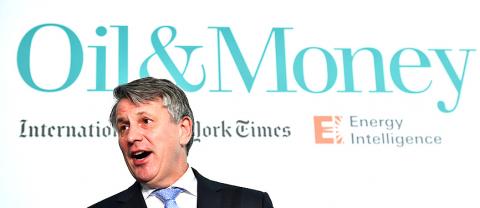Royal Dutch Shell cleared the final regulatory hurdle for its takeover of BG Group after receiving the green light from China yesterday, leaving the deal on track for completion by early next year following shareholder votes.
The combination is set to transform Shell into the world’s top liquefied natural gas trader and a major offshore oil producer focused on Brazil’s rapidly developing sub-salt oil basin that would rival ExxonMobil’s position as the world’s biggest international oil company.
The acquisition, worth about US$70 billion when it was announced and the biggest in the sector in a decade, had already received mandatory and unconditional approvals from Australia, Brazil and the EU.

Photo: AFP
Last month, the Chinese Ministry of Commerce pressed Shell to sweeten long-term liquified natural gas supply contracts as the world’s top energy consumer faces a large surfeit over the next five years, sources told reporters.
Since its announcement on April 8, when oil was at about US$55 per barrel, Shell has had to battle a slump in oil prices and investor concerns over the financial merits of the deal in the face of an extended period of weak energy prices.
Heralding a “more resilient and competitive” business, the Anglo-Dutch company slashed the combined group’s planned investment program, highlighted cost savings of US$3.5 billion and announced plans for US$30 billion in asset disposals to pay for the acquisition while maintaining the cherished dividend.
With the regulatory approvals out of the way, Shell and BG turn their focus to shareholders and are set to publish a prospectus containing information on the deal and the change in the share structure and also announce dates for general meetings where the transaction will be put to vote.
“We will now seek approval from both sets of shareholders as we move towards deal completion in early 2016,” Shell chief executive officer Ben van Beurden said in a company statement.
The integration of the two companies has been planned by a joint committee in recent months but could encounter some difficulties as BG’s small and relatively nimble operations are merged with Shell’s much larger structure.
The deal could also result in job cuts where BG’s 5,000 jobs overlap with Shell’s nearly 100,000 employees.

Intel Corp chief executive officer Lip-Bu Tan (陳立武) is expected to meet with Taiwanese suppliers next month in conjunction with the opening of the Computex Taipei trade show, supply chain sources said on Monday. The visit, the first for Tan to Taiwan since assuming his new post last month, would be aimed at enhancing Intel’s ties with suppliers in Taiwan as he attempts to help turn around the struggling US chipmaker, the sources said. Tan is to hold a banquet to celebrate Intel’s 40-year presence in Taiwan before Computex opens on May 20 and invite dozens of Taiwanese suppliers to exchange views

Application-specific integrated circuit designer Faraday Technology Corp (智原) yesterday said that although revenue this quarter would decline 30 percent from last quarter, it retained its full-year forecast of revenue growth of 100 percent. The company attributed the quarterly drop to a slowdown in customers’ production of chips using Faraday’s advanced packaging technology. The company is still confident about its revenue growth this year, given its strong “design-win” — or the projects it won to help customers design their chips, Faraday president Steve Wang (王國雍) told an online earnings conference. “The design-win this year is better than we expected. We believe we will win

Quanta Computer Inc (廣達) chairman Barry Lam (林百里) is expected to share his views about the artificial intelligence (AI) industry’s prospects during his speech at the company’s 37th anniversary ceremony, as AI servers have become a new growth engine for the equipment manufacturing service provider. Lam’s speech is much anticipated, as Quanta has risen as one of the world’s major AI server suppliers. The company reported a 30 percent year-on-year growth in consolidated revenue to NT$1.41 trillion (US$43.35 billion) last year, thanks to fast-growing demand for servers, especially those with AI capabilities. The company told investors in November last year that

Power supply and electronic components maker Delta Electronics Inc (台達電) yesterday said it plans to ship its new 1 megawatt charging systems for electric trucks and buses in the first half of next year at the earliest. The new charging piles, which deliver up to 1 megawatt of charging power, are designed for heavy-duty electric vehicles, and support a maximum current of 1,500 amperes and output of 1,250 volts, Delta said in a news release. “If everything goes smoothly, we could begin shipping those new charging systems as early as in the first half of next year,” a company official said. The new